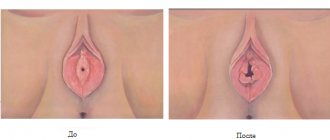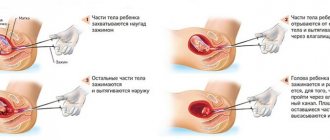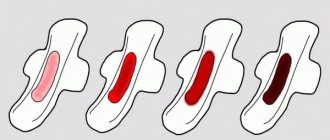The uterus is a muscular organ in a woman that performs the function of a fruit repository, i.e. Designed for pregnancy and childbirth. Any fertilized egg (zygote) that has begun to divide and implantation (attachment) occurs outside the uterus is called an ectopic pregnancy.
Ectopic pregnancy is a serious complication of pregnancy. It is dangerous for the mother's health due to the high risk of intra-abdominal bleeding. Ectopic pregnancy is considered a medical emergency as it can be fatal if left untreated.
The cause of ectopic pregnancy is often chronic inflammatory diseases of the pelvis, endometriosis, anomaly of the structure of the fallopian tubes, and recently, ectopic pregnancy can occur as a complication of assisted reproductive technologies. The risk of this pathology occurring is 2% in the population.
Ectopic pregnancy is classified according to the place of its attachment. This is how tubal pregnancy is distinguished - 98% of all ectopic pregnancies, ovarian pregnancy 1%, abdominal or abdominal 1%.
There are three stages in determining early pregnancy:
- So, if the next menstruation is delayed by 3-4 days, we can diagnose the so-called biochemical pregnancy (according to the hCG blood test), when the size of the future fertilized egg is so small that it is impossible to visualize it by any method
- Then, after 10-12 days of delay and hCG 1200-1500 U/ml, we can visualize the fertilized egg in the uterine cavity using modern ultrasound machines (which are available at the Medsi St. Petersburg clinic). If there is no fertilized egg in the uterine cavity, the specialist will schedule a follow-up appointment in 2-3 days with a follow-up ultrasound and a blood test for hCG - if hCG increases and there is no fertilized egg in the uterine cavity, the doctor will promptly suspect the presence of an ectopic pregnancy and take the necessary measures to prevent complications
- The third important point is the appearance of embryonic heartbeats (this occurs after 18-20 days of delay of the next menstruation)
In the absence of such close attention to the development of pregnancy during early pregnancy, the patient should be alerted to such symptoms as:
- Pain: it can be aching, cramping or cutting. Pain occurs in the lower abdomen on one side, and when blood spills into the abdominal cavity, it can radiate to the anus, epigastric region and shoulders. Urination and bowel movements may also be painful
- Bleeding: Although during an ectopic pregnancy bleeding from damaged vessels occurs into the abdominal cavity, uterine bleeding often occurs due to a drop in progesterone levels. Bleeding may resemble menstruation, but in most cases the bleeding is scanty and lasts a long time. Heavy uterine bleeding is extremely rare
Both of these symptoms are an indication for seeking emergency care, calling an ambulance (which is available at the Medsi St. Petersburg clinic) and, if necessary, hospitalization for examination and treatment.
Treatment of ectopic pregnancy is only surgical. It is used when a diagnosis has been established for an uncomplicated ectopic pregnancy without bleeding (in cases of timely diagnosis) or in the presence of clinical manifestations and ongoing bleeding.
At the Medsi St. Petersburg clinic, 99% of operations performed for ectopic pregnancy are performed laparoscopically. When pregnancy develops in the fallopian tube, it is removed along with the fertilized egg.
To provide emergency care, the clinic has everything you need: a laboratory that provides quick diagnostics and state-of-the-art laparoscopic operating rooms with specially trained personnel, intensive care in case of massive blood loss, as well as a comfortable hospital with single and luxury wards. Medsi Clinic St. Petersburg is open 24 hours a day, 7 days a week - we are ready to help you.
Delayed menstruation after ectopic
The recovery period after an ectopic pregnancy is individual for each woman and depends on a fairly large number of factors. Lack of menstrual bleeding after treatment should be a cause for concern and require medical attention. However, in most women it begins on time or there is a slight delay in menstruation after an ectopic.
A delay in menstruation after an ectopic pregnancy is most often due to the fact that the pregnancy itself was diagnosed quite late, which is why the recovery period is somewhat longer.
In addition, the delay is often provoked by the stress experienced by the woman caused by an ectopic pregnancy. In such cases, it may take from one and a half to two months to restore the cycle.
Text: Oksana Klenova
4.53 1 1 1 1 1 Periods after an ectopic pregnancy 4.5 out of 5 (30 votes)
Menstruation after treatment
An ectopic pregnancy does not resolve on its own. Depending on the degree of its development, it is possible to remove the fertilized egg laparoscopically or using a special drug; in the worst case, the woman loses one of the fallopian tubes.
Naturally, she is worried about what and when her periods will be after an ectopic pregnancy. After all, doctors try to preserve the chance of becoming a mother whenever possible.
Cycle recovery
Laparoscopy for ectopic pregnancy
The most burning question: when will your period start after an ectopic pregnancy? Many are in a hurry to try again, because they are sure that time is working against them in this regard. This is a big mistake, the body needs rest and time to recover.
It is also necessary to find out the reasons for improper attachment of the fertilized egg, so that in the future they do not interfere and do not cause a similar situation again. The second tubal localization of the embryo will reduce the chances of having a child.
For some, the first period after an ectopic pregnancy occurs immediately after surgery, within a day or two. This can be regarded in two ways, as it is caused by different reasons:
- Rapid restoration of the reproductive system;
- Hormonal imbalance that provoked uterine bleeding.
The last option is the most likely. Doctors do not consider it something dangerous; rather, they perceive it as cleansing the uterus from an overgrown layer of mucous cells. But the process is always monitored, and if necessary, hemostatic drugs are prescribed.
For the majority of those operated on, menstruation occurs 25-30 days after the intervention. This is the standard cycle size, indicating the good ability of the reproductive organs to recover.
At the rehabilitation stage, the woman’s behavior is important; she needs to monitor her own regimen, minimize physical activity, avoid taking a bath, limiting herself to a shower. Sex should also be moderate and accompanied by protection.
Lack of menstruation
A delay in menstruation after a problem is also a likely occurrence. It can be caused by several circumstances:
- Hormonal disorders. They can be observed even before pregnancy and cause its incorrect development. After treatment, the problem can worsen, as other factors come into play (nervous tension, anesthesia, medications);
- Stress. The very fact of the ectopic location of the ovum can be a serious shock for a woman who wants to become a mother. There is also increased anxiety associated with surgical intervention and fear of the inability to have a child in the future;
- The complexity of the treatment. The level of trauma to the reproductive organs, and therefore the speed of restoration of their functions, depends on it. The more severe the intervention, the more likely and longer the delay will be.
Absence of menstruation for the above reasons is considered acceptable for up to 2 months. Further delay requires targeted elimination, that is, drug therapy.
We advise you to read the article about signs of pregnancy before your missed period. You will learn about the first symptoms, such as breast sensitivity, pain in the sacral area, problems with the digestive system, toxicosis and others.
Character of menstruation
Menstruation after surgery may change compared to what was recorded before. Since the “memory” of the reproductive system is long, it can be expressed in the nature of menstrual flow. However, difficulties with the cycle and the characteristics of menstruation are not always to blame for the operation.
The causes of problems of all kinds can be the same factors that led to the localization of the embryo in the fallopian tube or other inappropriate place in the abdominal cavity. These are chronic inflammation, hormonal deficiency, constant stress and gynecological diseases.
The first period after an ectopic pregnancy can provoke very noticeable sensations. This:
- Pain in the abdominal area. Its intensity depends on the level of intervention and the woman's ability to tolerate cramps. The pain is caused by the normal contractions of the uterus during menstruation, which radiate to the area of the fallopian tube. If it persists, adhesions may form in the tissues, adding to the discomfort. If the tube is removed, painful periods occur due to insufficiently restored tissues, to which vibrations are transmitted from the contraction of the smooth muscles of the organ;
- General weakness. The intervention takes place under anesthesia, which is necessary, but does not add strength to the woman. During menstruation, immunity decreases, due to hormonal imbalance, lethargy and drowsiness appear. After surgery and great emotional upheaval, they may intensify.
Despite the rapid restoration of menstruation, there is no need to rush into a new conception. The reproductive system needs a break from the shock it has suffered. We are talking about both the ectopic pregnancy itself and the operation.
Even medical removal of the fertilized egg, which is possible in the early stages, requires “quarantine” for at least six months. For this purpose, oral contraceptives are prescribed, which are selected by a specialist.
Treatment of ectopic pregnancy
Laparoscopic surgery is usually used to treat ectopic pregnancy. During the operation, both the fertilized egg located in the tube and the entire tube can be removed. The pipe is removed in cases where a rupture has already occurred.
Chemotherapy using methotrexate is also possible. The result of treatment is the cessation of development and resorption of the fertilized egg. However, this treatment method is effective only in the early stages of such a pregnancy.
In each specific case, therapy is determined based on the individual characteristics of the development of the pathology.
Ectopic and menstruation: does this happen?
Since no woman is immune from such a development of events after conception, everyone should know whether menstruation can occur during an ectopic pregnancy. After all, it is thanks to this sign that it is detected at an early stage, without waiting for complications that could pose a danger to life or reduce subsequent chances of conception.
The threat is created by severe bleeding, which opens after a fallopian tube ruptures. And difficulties with a new pregnancy arise after its forced removal, which is necessary to save a life.
Whether menstruation occurs during an ectopic pregnancy is determined by the processes occurring in connection with its presence. The amount of progesterone that holds the lining of the uterus in place is quite high. But since its cavity is empty, some endometrial cells can separate and come out.
Whether menstruation occurs during an ectopic pregnancy also depends on the woman’s general condition. Hormone deficiency, often observed during its normal course, also occurs with tubal. It is also capable of causing discharge when it should not occur.
Menstrual-like mucus can also be caused by implantation of the fertilized egg into the tissue of the fallopian tube or others, depending on its location.
Menstruation during ectopic pregnancy
Causes of ectopic pregnancy
The main cause of ectopic pregnancy is a change in the fallopian tubes caused by various inflammatory processes or their congenital underdevelopment (infantilism).
The first place among other diseases that disrupt the normal course of all processes associated with the onset of pregnancy is given to chronic salpingitis. This disease is nothing more than the process of formation of adhesions in the oviducts. And it is provoked by infections transmitted through sexual contact. The situation can be aggravated by artificial termination of pregnancy, surgical interventions previously performed in the pelvic organs, as well as various types of diseases of the reproductive system.
As for congenital malformations of the tubes, these include:
- Duplication of the fallopian tubes (this pathology can be observed on both sides or only on one);
- Underdevelopment of the fallopian tube;
- Agenesis (absence) of the fallopian tube;
- Pipe asymmetry;
- Excessive shortening/lengthening of pipes;
- The presence of additional blind passages in the fallopian tubes;
- Splitting of the lumen of the fallopian tube;
- Congenital obstruction of the fallopian tubes.
Various tubal anomalies develop in girls even in the prenatal period and almost always through the indirect fault of the mother, who took medications prohibited for pregnant women during pregnancy, was exposed to the negative effects of harmful factors (for example, radiation), suffered from infectious diseases of the reproductive system, etc. .d.
In addition, the following can lead to pathology:
- Diseases of the endocrine system, as a result of which the peristalsis of the tubes is disrupted;
- Taking separate contraceptives;
- In vitro fertilization: according to statistics, approximately every twentieth patient who has undergone the procedure of artificially introducing a fertilized egg into the uterine cavity is subsequently diagnosed with an ectopic pregnancy due to the fact that the egg could penetrate slightly further than required;
- Disturbance of normal hormonal levels.
Factors that increase the risk of developing an ectopic pregnancy are:
- Smoking (since it can impair the peristalsis of the fallopian tubes and disrupt the process of normal movement of the fertilized egg through them);
- Wearing too tight and synthetic underwear;
- Frequent hypothermia;
- Age (in women over 35 years of age, cases of ectopic pregnancy are diagnosed more often than in younger patients);
- The presence of tumors in the uterus or its appendages.
Periods after ectopic pregnancy
I had an ectopic pregnancy. On July 29, they did a laparoscopy... they saved the tube... they said my period would be in a month, but it started yesterday on August 1 and it hurts a lot, the blood is scarlet (usually there is no pain). The doctor said that everything was fine, but I couldn’t believe it... everyone says different things and they didn’t prescribe me any medications after the laparoscopy. Who has a similar story... share... I’m very worried (((
Read 20 comments:
I sympathize: (same thing. I’m going to the hospital
As far as I heard, periods after laparoscopy come in a few days...
My periods started immediately after the operation, like a day later, and they were VERY heavy, I barely had time to change night pads, and as a result, on the 3rd day I was given a hemostatic injection, and my flow began to decrease. The doctor said it was normal. The next period came on schedule, after 28 days.
After VB, it is necessary to undergo a course of restorative anti-adhesion therapy. And the main thing is to find out and eliminate its cause.
I had laparoscopy done 2 times, my period came every other day.
About the drugs. At the hospital they injected me with antibiotics. I was prescribed metronidazole (to prevent inflammation) and thromboass. I also inserted Longidaza.
But they still had to prescribe medications...
Marmeladka, lapara lapare discord. After VB, everything happens in the body as after an abortion. They removed the fruit - they came M
The mucous membrane of the uterus was preparing for b sung and m so abundant
I also started having M immediately, this is normal. You now need anti-adhesion therapy. I was prescribed Longidaza and leeches. Some people are also prescribed antibiotics. When you come to your G after discharge, she should prescribe it for you and not in the hospital.
It is quite possible that you were given an antibiotic once during surgery or immediately after it. For example, this happened to me.
My period started the day after surgery.
Ta777nya, they told me I can’t take metronidazole, it damages the liver and kidneys. Only vaginally. Of course, I didn’t have a VM, but a ST.
I was operated on July 30th. My period started 2 days later. I was prescribed to drink only COCs.
Thank you girls... I went to another gynecologist today... I looked at the chair and said that it was my period and that was good))) I prescribed distreptase suppositories for the day hospital (physical procedures)... and a month later Zhanine for at least half a year... I just don’t understand why to protect yourself for so long, the operating doctor said 3 months…. and who to believe.
After any surgical intervention, adhesions form; I do not recommend using protection for a long time.
Thank you... 3-4 months and we’ll try again
Now I know why the menses began so early... after all, when I was admitted to the hospital for an ectopic, I was told to continue drinking duphaston... and I drank it for another 3 days under observation in the hospital before the diagnostic laparoscopy, but alas, they found a classic ectopic and naturally, when I stopped duphaston, the so-called mesiki
Girls, I was treated with methotrexate. A couple of days after discharge, my period began. Very strong, and at first there was liquid blood (I thought bleeding), and then the clots appeared. During the examination, the doctor said that everything was fine, it was just menstruation. Today it’s been 6 days since I’ve been leaking, and I’ve been sick for more than a month. She also said that they can go longer than usual. That's it! Good luck and HEALTH to all the girls.
Olenka5544, I also created a similar blog the other day; I also had surgery in July. My period came on time, but very little, and then at 8 days I still missed it... For a week. And then everything stopped.
Sources used: www.my-bt.ru
Questions
Question: When should you get your period after an ectopic pregnancy?
When should menstruation start after surgery to remove an ectopic pregnancy?
After an ectopic pregnancy, menstruation should occur within 28 to 40 days. Moreover, the onset of menstruation should be counted from the day of the operation for ectopic pregnancy.
If bloody discharge from the genital tract appears earlier than 25 days after surgery for an ectopic pregnancy, this is uterine bleeding and not menstruation. If such uterine bleeding develops, you should immediately call an ambulance.
If menstruation after surgery for ectopic pregnancy has not begun within 40 days, you should contact a gynecologist for a routine examination and identify the causes of this condition.
The exact date of the onset of menstruation after an ectopic pregnancy cannot be determined, since after the operation the woman’s hormonal balance is disrupted. It is simply impossible to predict how he will recover and when the first menstruation will begin after surgery with an accuracy of 2–3 days.
However, women who want to accurately calculate the timing of their expected menstruation can use the following rules. The day on which the operation was performed should be considered the first day of the next menstrual cycle. Accordingly, to the date of the operation you should add as many days as the woman’s menstrual cycle usually lasts. Then subtract 5 days from the received date. Add 10 days to the same calculated date of the next menstruation. The interval obtained as a result of subtracting and adding to the estimated date of menstruation is the approximate and most accurate date for the arrival of menstruation for a particular woman.
Let's look at an example. The operation for an ectopic pregnancy was performed on July 1. A woman's normal menstrual cycle is 28 days. This means that after the operation, menstruation should begin on July 28. Subtract 5 from the 28th, we get July 23rd. We add 10 to the 28th number, we get August 7th. This means that the most accurate interval in which menstruation should come after an ectopic pregnancy in this particular woman is from July 23 to August 7.
Sources used: www.tiensmed.ru
An ectopic pregnancy is a dangerous complication of pregnancy when a fertilized egg does not enter the uterus, but is fixed outside its cavity. In 98% of cases this occurs in the fallopian tubes.
Ectopic pregnancy is a medical emergency. Otherwise, internal bleeding may endanger the woman's life.
Many women are concerned about the question: how soon after surgery will the normal menstrual cycle be restored and when is it possible to plan a pregnancy again?
Typically, menstruation comes 30 days after the termination of an ectopic pregnancy. A delay of more than 40 days may indicate a hormonal imbalance.
Let us note right away: termination of pregnancy is stressful for the body. Even if an ectopic pregnancy was detected at an early stage and removed with a mild laparoscopic operation, the body does not immediately return to normal. Changed hormonal levels, endometrium and ovarian function require sufficient time to recover.
For the same reason, the use of oral contraceptives after termination of an ectopic pregnancy is not recommended. There is a known practice when, under normal conditions, a course of oral contraceptives is prescribed to stabilize the menstrual cycle. However, after termination of pregnancy due to hormonal imbalance, taking oral contraceptives can lead to profound suppression of ovarian function.
Physiotherapy has a good therapeutic effect after tubal surgery. If you have concomitant diseases (endometriosis, polyps, etc.), you should consult with your doctor. Physiotherapy can have a catalytic effect on these unwanted pathologies.
Restoring the menstrual cycle and planning pregnancy
Many women tend to consider the normalization of the menstrual cycle as an opportunity to plan a pregnancy again. However, the condition of the fallopian tubes and endometrium of the uterus may be unsatisfactory even when the cycle is restored. It is usually not recommended to become pregnant in the first 3 months after terminating an ectopic pregnancy. It is better to plan a second pregnancy after consultation with your doctor.
In the case of preserved fallopian tubes, the possibility of spontaneous pregnancy cannot be excluded.
If one of the tubes was removed during surgery, the possibility of natural conception through the second fallopian tube is allowed. However, it is worth remembering that after a tubectomy, the remaining tube also needs therapy, especially if intra-abdominal bleeding has been observed. Periods after ectopic pregnancy
How to suspect a tubal pregnancy?
Despite the initial similarity with the usual “interesting situation,” differences appear soon enough. So, the condition is characterized by the following symptoms:
- Menstruation or similar discharge appears intermittently, with varying intensity, color and consistency;
- The hCG volume is lower than usual at this time;
- Feeling dizzy, low blood pressure;
- The stomach hurts in the lateral part, the sensations increase;
- Body temperature may be elevated.
It is useful to learn how to distinguish an ectopic pregnancy from a period, keeping in mind the problems it brings:
- Menstrual pain gradually subsides, but with abnormal localization of the fertilized egg, this sensation increases. An ectopic pregnancy makes it stronger in the area where the embryo is stuck;
- Discharge during menstruation is more uniform and comparable to that observed in the previous cycle. They last 3-7 days. Discharge during an ectopic pregnancy is often brown, spotting or with clots, and may look like coffee grounds. They are characterized by intermittency, a longer duration, even when there is not so much daub;
- Unpleasant sensations in the chest disappear with the onset of menstruation, the tissues become soft, and soreness goes away. With tubal pregnancy, all signs remain and may intensify;
- On critical days, appetite usually does not suffer, but a craving for sweets appears. Menstruation during an ectopic pregnancy is accompanied by an aversion to food and sometimes the inability to take a sip of water. Or there is another extreme - you want to try something that is not eaten;
- Menstruation comes on schedule. For discharge caused by ectopic pregnancy, there is sometimes no periodicity; it may occur with a delay. But sometimes they begin according to the schedule of menstruation, which makes it difficult to understand what is happening.
We recommend reading the article that talks about the possibility of menstruation during pregnancy. You will learn about the dangers of spotting, when there is a threat of miscarriage and if necessary, see a doctor.
What is menstruation like?
Strictly speaking, this discharge during an ectopic pregnancy is not menstruation.
But leaving the genital tract can lead to an erroneous interpretation of what is happening, which can waste time. And this is fraught with more complex and traumatic treatment. If you know what periods are like during pregnancy, measures to eliminate it can be taken on time, preserving all organs, and therefore the opportunity to give birth in the future. Modern doctors have the means to clean out the fertilized egg, leaving the fallopian tube intact.
Menstruation can have different appearances. At the same time, they have a certain set of characteristics that distinguish them:
- Scanty discharge. They are observed when the fertilized egg is separated from the walls of the fallopian tube. This is the best outcome in this situation, but it does not happen in all cases. The same is true for menstruation in early ectopic pregnancy, when the embryo is still implanting in the tube. Its walls are injured, blood vessels burst, which causes a slight bruise with pain.
- Intense discharge. Heavy periods during an ectopic pregnancy are caused by the implantation of the fertilized egg in the area of the cervix of the organ. There are many blood vessels there that are damaged. The discharge literally pours out as the embryo grows, injuring an increasingly wider area of the organ. They last for a long time, causing pain in the suprapubic part of the abdomen and side, and rapid loss of strength.
- Uneven discharge. Ectopic pregnancy and periods with clots are also often observed phenomena. Along with the blood, endometrial tissue, particles of the walls of the fallopian tube or fertilized egg may come out.
The most dangerous discharges are those caused by organ rupture. The abundance of discharge increases, the color becomes dark brown, and the pain intensifies. The woman may vomit and lose consciousness. This is an emergency that is best not allowed to happen.
Here it is no longer possible to do without an operation to remove the tube, but the danger to life remains after it, since blood entering the abdominal cavity can cause sepsis.
Considering all the threats, there is no need to doubt whether menstruation is possible during an ectopic pregnancy. If there are all the signs, including discharge, you need to hurry to the gynecologist, and not wait for them to intensify.











